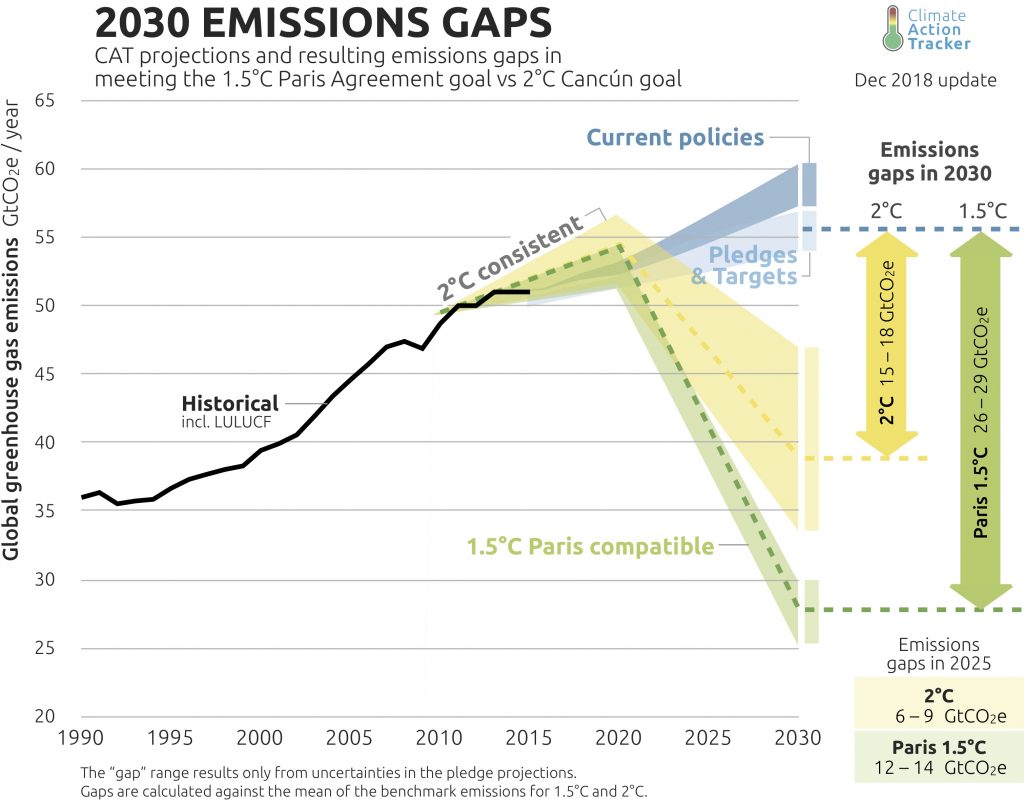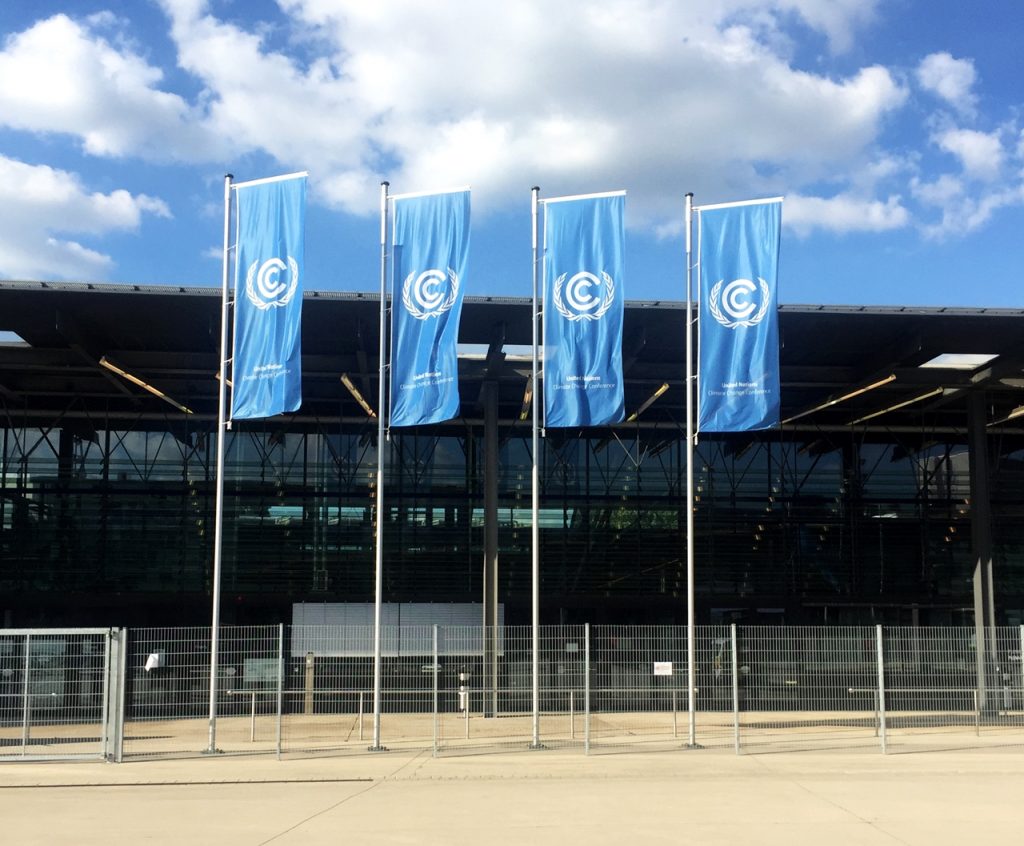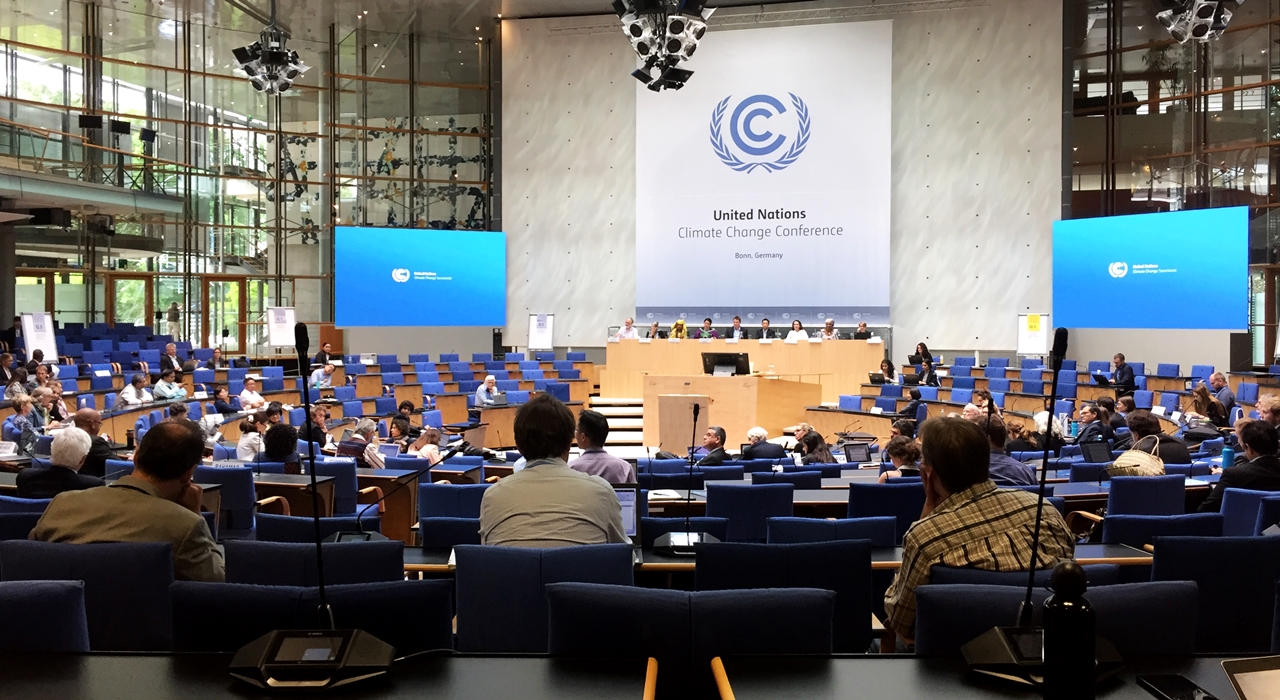The Executive Secretary of the United Nations Framework Convention on Climate Change (UNFCCC) Ms. Patricia Espinosa presented this quote in the intersessional meeting, which took place in Bonn, Germany from 17-27 June in 2019. I attended the meeting in Bonn as a non-governmental observer as part of the delegation for University of Helsinki. Ms. Espinosa’s idea summarizes the atmosphere of the conference: we are in a hurry and we need to do more. We have a crisis called climate change that is influencing our own life, yet our response is not fast enough. If there would be a fire in the kitchen, how many of us would wait and watch our house burn? I have to believe that many would step up and take action.
Last year, in December 2018, the Katowice climate conference delivered a rulebook for the implementation of the Paris Agreement (PA) and the Bonn meeting was especially preparing a few unfinished matters of the PA implementation for the COP25 in Santiago, Chile in November 2019. The key issues on the table included the market mechanisms of the Article 6, transparency framework, loss and damage, adaptation fund, 1.5˚C report by the Intergovernmental Panel on Climate Change (IPCC), common time frames for the Nationally Determined Contributions (NDCs), the Secretary summit and the 2020-2021 budget for the UNFCCC Secretariat. Particularly, the market mechanisms, budget and the level of acknowledgement of the IPCC report proved to be the most difficult questions during the two weeks in Bonn.
The Year of Climate Ambition
Besides the technical details, the conference highlighted that this is the year of ambition in climate politics. The request for more ambition arises mainly from two deadlines. Firstly, the IPCC Special Report, published in 2018, emphasized the urgency to keep the rise of global average temperatures below 1.5˚C instead of the previous 2˚C recommendation. Now, we are not on track to 1.5˚C but according to Climate Action Tracker, we are heading towards 3.3˚C if we achieve the current policies. Thus, the Special Report highlighted the important deadline of the Paris Agreement: by 2030, the global net human-caused emissions of carbon dioxide (CO2) needs to decrease by 45 percent from 2010 levels by 2030 and by 2050, we need to reach net zero emissions.
Second deadline influencing the ambition discussion, is the element of Paris Agreement to keep improving the climate action. Nations are expected to submit their Nationally Determined Contributions (NDCs) every five years to clarify their climate action acknowledging the national circumstances. Countries are expected to develop their second round pledges by 2020. So far, only Marshall Islands have submitted theirs. The current NDCs do not correspond the 1.5˚C path but as many nations reminded in Bonn, the first NDCs were submitted in an era when we did not know enough.
Now we know and we have more tools to plan the NDCs. Hence, the expectations for the second round have also increased: it is crucial that the new NDCs will follow the 1.5˚C path. Though, the Special Report did not receive a welcoming response from Saudi-Arabia and other oil-producing nations in the negotiations, the true strength of the report is seen as how much does its message manage to influence the new NDCs.
To sum up the important deadlines, we need to achieve zero emissions by 2050 by taking up the first step by 2020 in NDCs. In Bonn, many nations promised new NDCs as an act of stepping up. However, this is no longer ambitious enough. We do not need just the NDCs; we need ambitious NDCs with a sharp long-term vision towards 2050.
In my opinion, the positive outcome of Bonn was that this attitude for climate ambition has become mainstream in a way: we are no longer expecting climate leaders to step up but we need everybody to step up. We are no longer waiting for a few leaders but leadership is expected from all nations if we want to reach the 1.5˚C path. This is clear when one looks at figure 1 and how steeply and rapidly the emissions need to decrease by 2030. Mr. Niklas Höhne from New Climate Institute stated in a side-event in Bonn that
“All nations need to go to zero emissions. Some might need support in this but it does not mean that it is not an option to go to zero by 2050.”

Failure in climate finance might lead to failure in climate ambition
Though it sounds rather simple, Mr. Höhne mentioned the one key challenge: some nations might need support in this. The Head of Delegation (HoD) of Egypt, Mr. Wael Aboulmagd reminded everyone in Bonn that the responsibility for climate change is not on the footstep of the developing countries. However, during the conference, about 30 developing countries responded to the ambition request by stating that they will enhance their NDCs next year. What I found worrying and optimistic at the same time, was that many developing countries stated that they really hope to show climate leadership as soon as they get the support promised. Their stepping up is a positive sign but the time is running out as currently the pledges made for capacity-building assistance do not reflect reality. Many HoDs from developing countries shared the same concern in Bonn: the compromises agreed in PA were based on the understanding that there will be support. For instance, Mr. Aboulmagd stated that
“Developed countries should bridge the gap between the financial pledges and reality before we can expect more climate ambition.”
Developed countries are expected to take the lead in climate action because of their historical emissions. The HoD of India, Mr. Ravi Shankar Prasad asked how do we measure the leadership of developed countries? The fear of developing countries is that the negotiations and the upcoming COP25 will be too much mitigation centered though we should not forget adaptation. Can a developed country be a climate leader if it has an ambitious emission reduction target but is not fully carrying its responsibility with the financial pledges?
We need to be successful in short- and long-term
Throughout the conference, I noticed that I kept wondering about how do we actually measure climate leadership? What is clear is that ambitious action is not something that would happen anyways without the action taken. The host-country for Pre-COP event 2019, Costa Rica, asked an important question that got stuck to my head: is even the ambition in NDCs enough for the 1.5˚C target? We focus so much on NDCs but if the overall target is not in line with the zero emissions by 2050, it will be too late to change the direction in the third round of NDCs. Ms. Andrea Meza, Climate Change Director from the Ministry of Environment and Energy from Costa Rica, emphasized the importance of long term strategies by stating that
“Maybe we are focusing too much on NDCs, maybe the decarbonisation target is the new climate leadership.”
This short- vs. long-term idea, I find corresponding well with the idea of sustainability. We cannot focus on treating only the symptoms; instead, we need to find a cure for the disease. It does not mean that the NDCs would not be important but the Parties should first enhance the long-term strategies and then develop their NDCs alias short-term plans. Now, the situation is the opposite. According to the UNFCCC submission portal, 165 countries have submitted their NDCs when only 12 nations have returned their long-term strategies.
However, positive news is that there are more and more nations stepping up with zero-emission targets. Megan Darby from Climate Home News rightly questions whether even decarbonisation is enough but labels the vision of carbon-free future as becoming “the new benchmark for climate leadership on the world stage”.

What to expect by COP25?
Autumn will expectantly bring a number of climate pledges. Chile, the host for COP25, has promised to submit their second NDC in November. In September 2019, the UN Secretary General António Guterres will organize a Climate Action Summit in New York labelling climate change as a “race we can win”. In Bonn, in the briefing of the Summit the message from Secretary General was that he wishes all Parties to participate and deliver something concrete to show for their ambition. My personal wish list is that this “concrete” will not only be ambitious NDCs but also ambitious long-term strategies with plans for decarbonisation, more financial pledges for climate finance and improvement ideas for access of the funding and efforts to find more synergies between the Sustainable Development Goals and NDCs. I want the concrete actions to not only acknowledge the fire but also acknowledge that it is not in somebody’s kitchen, it is in our joint kitchen. Hence, we have a joint responsibility to put out the fire.
Karoliina Hurri
Karoliina is a PhD Candidate in World Politics in the University of Helsinki. She is part of Veli-Pekka Tynkkynen’s research team in Aleksanteri Institute and a member of the Helsinki Institute of Sustainability Science (HELSUS). Karoliina’s dissertation “The Construction of China’s Leadership Role in International Climate Politics” is funded by The Tiina and Antti Herlin Foundation.
References and further reading
Bonn Climate Conference (2019). Official website for Bonn SB50.
Climate Action Summit (2019). Official website for Climate Action Summit.
Climate Action Tracker (2019). CAT Emissions Gaps.
COP25 (2019). Official website for COP25.
Darby, M. (2019). Which countries have a net zero carbon goal? Climate Home News.
Honkatukia, O. (2019). Bonnista pohjateksti Chilen ilmastokokoukseen. Kohti nollapäästöjä-blogi, Ympäristöministeriö.
Intergovernmental Panel on Climate Change. (2018). Global Warming of 1.5°C. An IPCC Special Report on the impacts of global warming of 1.5°C above pre-industrial levels and related global greenhouse gas emission pathways, in the context of strengthening the global response to the threat of climate change, sustainable development, and efforts to eradicate poverty. Geneva, Switzerland: World Meteorological Organization.
New Climate Institute (2019). A Ten Point Agenda for Delivering Higher Mitigation Ambition (2019).
UNFCCC INDC Submission Portal. (2019). INDC submissions of Parties. United Nations.
Weston, P. (2019). Saudi-led group of oil-producing countries gets major climate report scrubbed from UN negotiations. Independent.
Photos by: Karoliina Hurri

